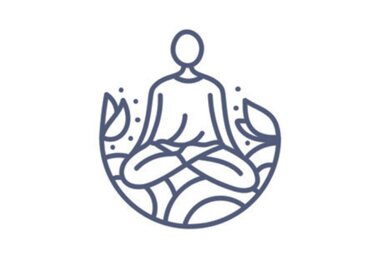12 April 2023
To mark April as Stress Awareness Month, the KHP Mind & Body Programme has collated a selection of wellbeing resources for staff and students across the partnership.
Research has shown that high levels of stress can often impact the mind and body in various ways, including affecting the ability to sleep and producing low mood. Long-term stress can increase the risks of cardiovascular disease - hypertension, heart attack, and stroke. Relieving stress has been found to improve sleep quality, help with the control of weight, improve mood, and help with having less muscle tension.
Mindfulness
The Mindfulness For All (M4ALL) project has been running for more than two years, launching as a support network for staff in the midst of the pandemic. Mindfulness meditations have been found to improve wellbeing, relieve physical stress, and improve overall mental health.
What is mindfulness?
- Deliberate, curious attention to what’s happening right now;
- Taking a stance of kindness to ourselves and others;
- Cultivated through guided practices (often focussing on the breath and body);
- For example, resting our feet flat on the ground and noticing how the ground supports us or placing a hand on our belly and noticing how it gently rises and falls as the body breathes;
- And in everyday life (such as noticing what is around us as we walk).
To access the resources, visit the KHP Learning Hub here. There are further resources on the new Integrating Mental & Physical healthcare: Research, Training & Services (IMPARTS) website, here.
Mindapples
 Mindapples are simple day-to-day activities that can be good for the mind. The concept of mindapples is to make looking after our minds as natural as brushing our teeth, to build a positive culture for mental health.
Mindapples are simple day-to-day activities that can be good for the mind. The concept of mindapples is to make looking after our minds as natural as brushing our teeth, to build a positive culture for mental health.
Simple activities like sleep, water, and exercise can improve your mood and keep you healthy, while integrating ‘breathers’ and ‘restorers’ into our daily routines can reduce stress and prevent future problems. Just like healthy eating or exercise, we need to build a popular culture of taking care of our minds, and make doing this easy and accessible for everyone.
What are your Mindapples?
Now think about five things you can do to improve, restore, or maintain your mental wellbeing.
These may be things you can do on a daily basis, and may centre around the five ways to wellbeing – more details on the NHS webpage here.
- Connect with other people
- Be physically active
- Learn new skills
- Give to others
- Pay attention to the present moment (mindfulness)
Wheel of wellbeing
 More and more research is showing us how certain things we do can improve our moods, reduce the risk of depression, strengthen relationships, keep us healthy, and even add seven years to our lives.
More and more research is showing us how certain things we do can improve our moods, reduce the risk of depression, strengthen relationships, keep us healthy, and even add seven years to our lives.
The way we think and feel is just as important as food and exercise. The wheel of wellbeing focuses on six-specific elements of wellbeing that are all linked with a positive suggestion for action.
Each part of the wheel represents different evidence-based actions that we can take to boost our wellbeing levels on a day-to-day basis.
- Body - be active: anything that gets our body moving around counts as being active;
- Mind – keep learning: this includes informal and formal learning;
- Spirit - give: helping others in any way, which includes small acts of kindness and practicing gratitude;
- People - connect: connecting with others;
- Place - take notice: being in the moment and taking notice of your surroundings. Spending time in a green space;
- Planet - care: caring for the environment.
For more resources, visit the Wheel of Wellbeing website here.
To download the full Mind & Body health and wellbeing toolkit, click here.
To learn more about the KHP Mind & Body Programme, visit the team’s webpages here.





